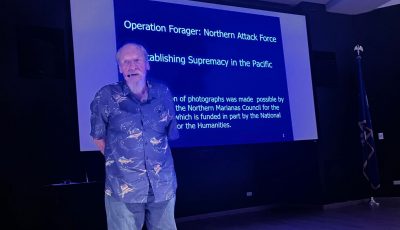US govt: Improper to initiate civil contempt against witness who failed to appear at trial
The U.S. government takes no position on whether the federal court should exercise its discretion to initiate criminal contempt proceedings against Rebecca Lynn Castro, a government’s witness who was arrested last week for failing to appear at the trial of couple Francisco Muna Tydingco and Lili Zhang Tydingco.
Assistant U.S. attorney Russell H. Lorfing asserted that while the U.S. District Court for the NMI has inherent authority to initiate criminal contempt under Rule 42 of the Federal Rules of Criminal Procedure, the U.S. government takes no position on whether the court should exercise that discretion in Castro’s case.
Because Castro’s testimony is no longer needed in the case against the Tydingco couple, her compliance with the subpoena is no longer warranted and as such the U.S. government concedes that civil contempt would be improper under these circumstances, said Lorfing in the U.S. government’s brief filed in court on Monday.
According to court documents, Castro was served with a subpoena to appear at the trial of the Tydingcos, but allegedly failed to do so. The trial began last June 7 and completed last June 13. The jury found the Tydingcos guilty of harboring an illegal alien.
Federal agents served to Castro in San Vicente a bench warrant issued by the federal court last June 9. Last Thursday, U.S. District Court for the NMI Chief Judge Ramona V. Manglona granted attorney Sean Frink’s request to release his client, Castro.
Manglona ordered Castro to appear in court on June 29 at 9am to show cause why she should not be held in contempt.
Frink argued that it is not clear whether Castro is facing criminal or civil contempt.
Manglona ordered the parties to submit briefs, stating the facts and laws in finding Castro in contempt.
In the U.S. government’s brief filed on Monday, Lorfing said after an extensive investigation in Tydingcos’ case, federal agents discovered evidence that Rongxue Liu intended to enter into a fraudulent marriage with Castro, a U.S. citizen.
Lorfing said the U.S. government believed Castro to be a percipient witness who could testify that Francisco Tydingco introduced Castro to Lili Tydingco for the purpose of arranging a fake marriage.
Lorfing said Lili Tydingco agreed to pay Castro for entering into a fraudulent marriage with Liu, although Castro never received payment.
He said the U.S. government sought and received a subpoena requiring Castro to testify at the trial of the Tydingcos.
The prosecutor said the court issued a subpoena commanding Castro to appear last June 7 at federal court, and that the subpoena was personally served on Castro last June 3.
Lorfing said he met with Castro on June 7 and advised her that she would be required to testify.
Lorfing said after a brief meeting, he advised Castro that her testimony was not expected until the following day.
Lorfing said Castro was told that the subpoena required her to return the following day.
The prosecutor also agreed to have law enforcement pick Castro up at 12pm the following day because she did not have a ride.
Lorfing said that last June 8, Homeland Security Investigations Task Force Officer Joel Tudela arrived at the pre-determined location to pick up Castro at 12pm, but Castro was not present.
Tudela waited for over an hour but she never appeared as promised.
Last June 9, Tudela went to Castro’s house to remind her that she had been subpoenaed to appear in court.
Lorfing said Castro would not come out the door.
Lorfing said Tudela waited outside the house to execute a bench warrant, but due to a miscommunication, Tudela left the premises without executing the bench warrant.
Lorfing said an hour later, Homeland Security Investigations agent Michael Lansangan arrived at Castro’s residence to serve the bench warrant.
Lorfing, however, said Castro was no longer at the house.
The prosecutor said it was last Wednesday, June 15, that U.S. Marshals executed the bench warrant on Castro.
Lorfing said civil contempt is designed to force the disobedient party to comply with a court order, while the purpose under criminal authority is to punish the witness’ disobedience.



























